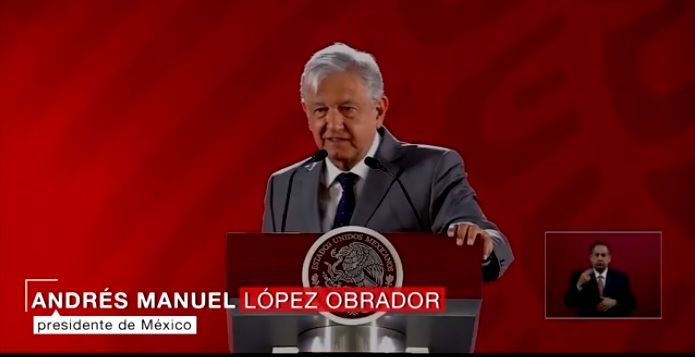A recent “invitation” to business leaders from Mexican President Andrés Manuel López Obrador to attend a fundraiser at the National Palace was an offer many couldn’t refuse. Some 70 of the Mexican “suits” who showed up reportedly pledged to spend 1.5 billion pesos ($88 million) on government lottery tickets.
About half the tickets in the pot—another 1.5 billion pesos’ worth—remained unsold at the end of the evening. The drawing is scheduled for September, when up to 100 winners will take home 20 million pesos each. The proceeds, if any, will be earmarked for public assistance, which the president says he will allocate to the nation’s ailing hospitals.
It’s unclear whether the scheme can succeed, but the larger problem is that it looks like pay-to-play. Presidential fundraising for pet projects has the whiff of illegality because the state dishes out valuable concessions and no-bid contracts and can let unpaid tax bills slide. Yet when AMLO—the president is known by his initials—does it, no one dares stop him.
The Mexican economy did not grow in 2019 and the standstill is expected to continue this year because business and government investment has collapsed. To understand why, look no further than Mr. López Obrador’s use of executive power to try to make himself the savior of the nation.
AMLO has a utopian vision for Mexico in which he gets to decide what economic fairness looks like and how rich is too rich. Think Bernie Sanders en español. Not all wealthy people are brought low—only the ones who get in the way.
AMLO’s decisions to scrap the construction of a new airport in Mexico City and to force the renegotiation of natural-gas pipeline contracts have received a lot of international attention. His effort to cap salaries at the central bank may violate the Mexican Constitution and is seen as a ploy to chase out qualified technocrats so he can replace them with political loyalists.
This smell bad. Behind the scenes it’s even worse, as “the law” is used to spread terror among opponents. A key tool is the Financial Intelligence Unit, which derives its power from international commitments to combat money laundering. The unit, which is inside the Treasury, is supposed to investigate suspicious financial activity and pass the information to the attorney general. In practice, critics say, it is being used to gain control of institutions that ought to be independent.
Mr. López Obrador remains popular because Mexicans still see in him a guy who is willing to stand up to corruption and crony capitalism. Hot money chasing high interest rates in Mexico has held up the peso, and U.S. ratification of a new North American free-trade agreement has removed a source of market uncertainty.
Yet 15 months into AMLO’s presidency, the weak economy, rampant violence and a breakdown of the public-health system have diminished his popularity. All eyes are now on the midterm elections of July 2021. If his Morena Party and its allies win two-thirds of Congress’s lower house and strong support among the nation’s 32 governors, he will have smooth sailing in the second half of his six-year term. If the opposition surges, he may become a lame duck.
Meantime, he is working to consolidate as much power as possible. The lottery spectacle at the National Palace showcased his muscle. He lavished praise on the tycoons, congratulating them for meeting their moral obligation to contribute to his causes.
Privately many Mexicans snickered about what was seen as a blatant act of extortion. The misuse of the Financial Intelligence Unit at the Treasury is also worrying. It has been employing its power selectively to pressure the president’s adversaries.
According to Article 115 of the banking and credit law and Article 41 of the anti-money-laundering act, officials at the Treasury must safeguard the confidentiality of ongoing investigations. Further, under Mexican law all suspects are entitled to the presumption of innocence. Yet the unit has a record of violating both norms, making public statements of condemnation and freezing the financial assets of the accused and their extended families even before charges are filed and without a judge’s ruling.
The chief of the unit, Santiago Nieto, told me Saturday that the prohibition on speaking about investigations applies only to the attorney general’s office and that he uses his freedom of speech to expose findings. He said freezing assets is an administrative tool to block the moving of money.
But Mexico’s Supreme Court has ruled that freezing assets without a court order is unconstitutional, and the attorney general has complained about the lack of due process. Nevertheless, the weaponization of the unit continues, probably because it gets results.
The head of the regulatory commission on energy and a Supreme Court justice were both named as suspects—along with family members—in possible financial crimes. Both maintained their innocence. But the freezing of assets meant possible financial ruin even if there was eventual exoneration. Neither was ever charged but both resigned. AMLO replaced them with his own handpicked appointees.
Tick-tock, Mexico.
By Mary Anastasia O’Grady – WSJ Americas columnist; editorial board member
The Wall Street Journal
@MaryAnastasiaOG – Twitter
Mary Anastasia O’Grady writes “The Americas,” a weekly column on politics, economics and business in Latin America and Canada that appears every Monday in the Journal. Ms. O’Grady joined the paper in August 1995 and became a senior editorial page writer in December 1999. She was appointed an editorial board member in November 2005. She is also a member of the board of directors of the Indianapolis-based Liberty Fund.

